Since the late 1960s, Gallup has periodically asked Americans whether the use of marijuana should be made legal in the United States. Although a majority of Americans have consistently opposed the idea of legalizing marijuana, public support has slowly increased over the years. In 1969, just 12% of Americans supported making marijuana legal, but by 1977, roughly one in four endorsed it. Support edged up to 31% in 2000, and now, about a third of Americans say marijuana should be legal.
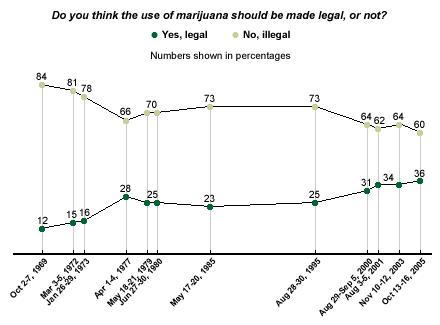
Certain groups of Americans are more inclined than others to support the legalization of marijuana. In order to better understand which groups of Americans are more inclined to support legalization, Gallup combined the results of three surveys, conducted in August 2001, November 2003, and October 2005*.
Gender, Age Shapes Support for Legalization
Support for marijuana legalization varies greatest by gender and age. Overall, younger Americans (aged 18 to 29) are essentially divided, with 47% saying marijuana should be legal and 50% saying it should not be. Support for legalization is much lower among adults aged 30 to 64 (35%) and those aged 65 and older (22%). Men (39%) are somewhat more likely than women (30%) to support the legalization of marijuana in the country.
When looking at the combined results by age and gender, the data show 44% of men aged 18 to 49 support the legalization of marijuana. This sentiment is lower among older men (33% for men aged 50 and older) and women of any age (34% for women aged 18 to 49 and 27% of women aged 50 and older).
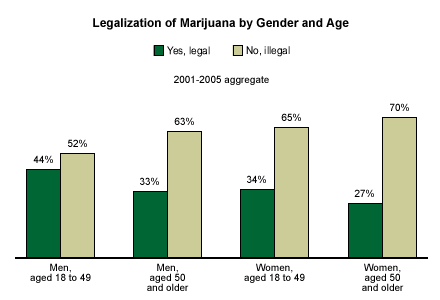
Gallup found similar patterns in 1973, a few years after it first started asking the question. That year, men were also slightly more likely than women, by 18% to 13%, to support legalization. A third of 18- to 29-year-olds (34%) agreed with legalizing marijuana, while no more than 11% of adults aged 30 and older agreed. And, about one in four men aged 18 to 49 (24%) supported legalization, compared with 7% of men aged 50 and older, 18% of women aged 18 to 49, and 6% of women aged 50 and older.
The data make it clear that despite the gender and age differences that still persist, all subgroups are more likely to support legalized marijuana today than three decades ago.
Westerners Divided in Views of Legalization
Americans residing in the western parts of the country are more likely than those living elsewhere to support the legalization of marijuana. These differences perhaps result from the fact that six Western states have, in various ways, already legalized marijuana for medicinal use. Overall, the data show that Westerners are divided about marijuana, with 47% saying it should be legal and 49% saying it should not be. No more than a third of adults living in other parts of the country feel marijuana should be legal.
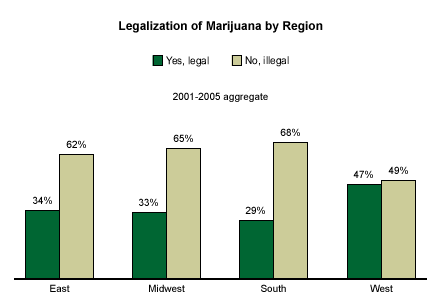
In 1973, Gallup found that residents in the East and West were more likely to support marijuana legalization than those in the Midwest and South. Roughly one in five Easterners (20%) and Westerners (22%) supported this idea, compared with 13% of Midwesterners and 10% of Southerners.
Church Attendance Related to Support
Only about one in six Americans who attend church or religious services weekly (17%) support the legalization of marijuana. Support is higher among those who attend less frequently -- 30% among those who attend almost weekly or monthly and 49% among those who rarely or never go.
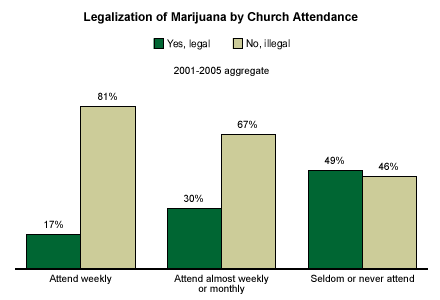
College-Educated Adults Give Slightly Higher Support for Legalization
Americans with some college education -- from those who have attended at least one college course to those who have postgraduate degrees -- are somewhat more likely than those without a college degree to say marijuana should be legal in the country. Thirty-seven percent of adults with a college education support legalization, compared with 31% of those with no college education.
The differences between these two groups were much more pronounced in 1973. At that time, 29% of college-educated adults supported legalization, compared with just 11% of those with no college.
Politics and Marijuana Legalization
Support for legalizing marijuana is much lower among Republicans than it is among Democrats or independents. One in five Republicans (21%) say marijuana should be made legal in this country, while 37% of Democrats and 44% of independents share this view.
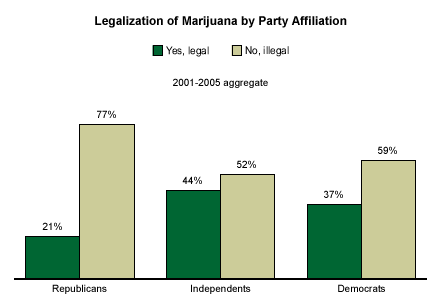
When Gallup asked this question in 1973, independents (25%) were at least twice as likely as Democrats or Republicans to support this idea. However, at the time, there were only slight differences in support between Democrats (13%) and Republicans (9%).
The data also show differences by respondents' self-described political ideology. Twenty-two percent of conservatives feel marijuana should be made legal, compared with 36% of moderates and a majority of liberals (54%).
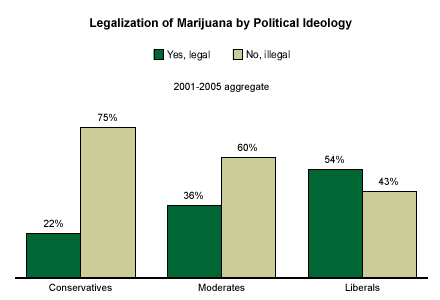
*Results are based on telephone interviews with 2,034 national adults, aged 18 and older, conducted Aug. 3-5, 2001, Nov. 10-12, 2003, and Oct. 21-23, 2005. For results based on the total sample of national adults, one can say with 95% confidence that the maximum margin of sampling error is ±2 percentage points.
In addition to sampling error, question wording and practical difficulties in conducting surveys can introduce error or bias into the findings of public opinion polls.
